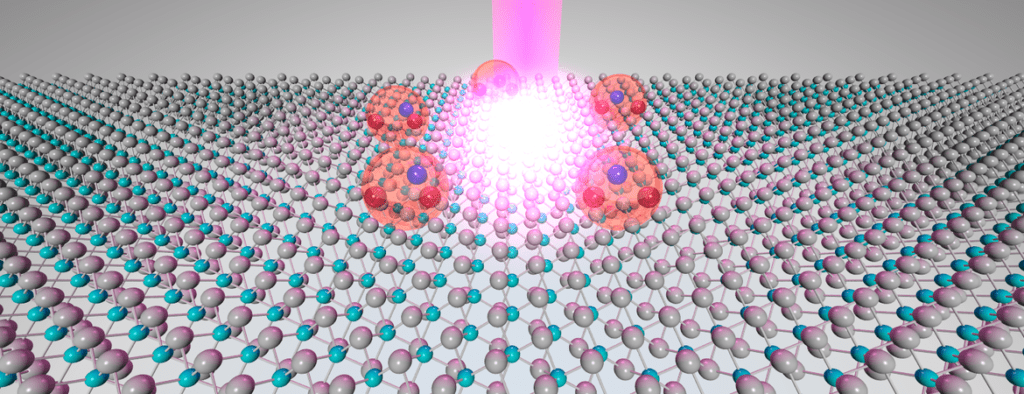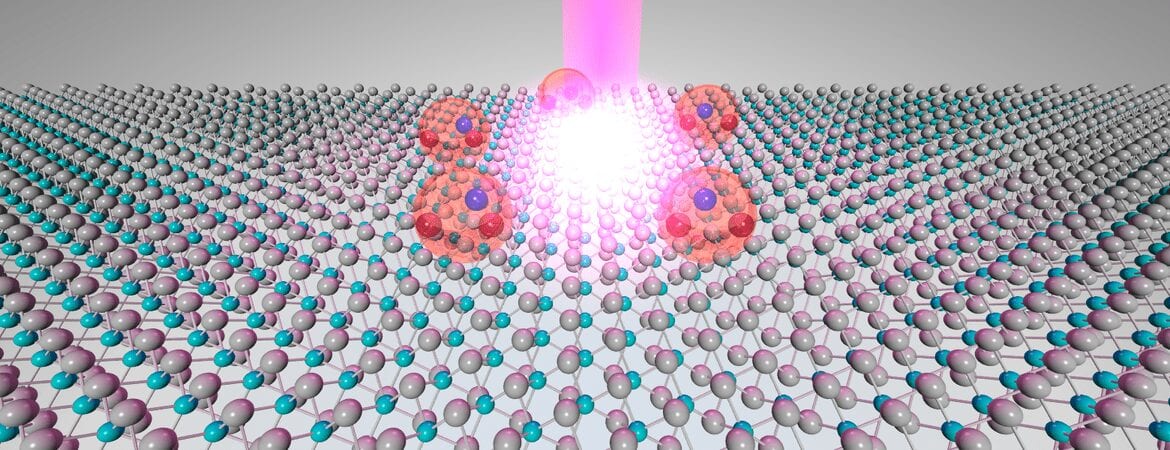
UC Riverside-led team identifies dark trions as the next carrier of quantum information
Most electronics today use individual electrons to conduct electricity and transmit information. As trions carry net electric charge, their motion can be controlled by an electric field. Trions can, therefore, also be used as information carriers. Compared to individual electrons, trions have controllable spin and momentum indices and a rich internal structure, which can be used to encode information.
Trions can be categorized into bright and dark trions with distinct spin configurations. A bright trion contains an electron and a hole with opposite spins. A dark trion contains an electron and a hole with the same spin. Bright trions couple strongly to light and emit light efficiently, meaning they decay quickly. Dark trions, however, couple weakly to light, meaning they decay much more slowly than bright trions.
The researchers measured the lifetime of dark trions and found they last more than 100 times longer than the more common bright trions. The long lifetime enables information transmission by trions over a much longer distance.
“Our work allows the writing and reading of trion information by light,” said Chun Hung (Joshua) Lui, an assistant professor of physics and astronomy at UC Riverside, who led the research. “We can generate two types of trions — dark and bright trions — and control how information is encoded in them.”
The results of the research are published in the journal Physical Review Letters.
“Our results could enable new ways of information transmission,” said Erfu Liu, the first author of the research paper, and a postdoctoral researcher in Lui’s lab. “Dark trions, with their long lifetime, can help us realize information transmission by trions. Just like increasing your Wi-Fi bandwidth at home, trion transmission allows more information to come through than individual electrons.”
The researchers used a single layer of WSe2 atoms, resembling a graphene sheet, because the dark trion energy level in WSe2 lies below the bright trion energy level. The dark trions can therefore accumulate a large population, enabling their detection.
Lui explained that most trion research today focuses on bright trions because they emit so much light and can be easily measured.
“But we focus on dark trions and their detailed behavior under different charge densities in single-layer WSe2 devices,” Lui said. “We were able to demonstrate a continuous tuning from positive dark trions to negative dark trions by simply adjusting an external voltage. We were also able to confirm dark trions’ distinct spin configuration from bright trions.
“If we can use trions to transmit information, our information technology will be greatly enriched,” he added. “The major obstacle in such a development has been the short lifetime of bright trions. Now the long-lived dark trions can help us overcome this obstacle.”
Next, his team plans to demonstrate the actual transport of information by dark trions.
“We intend to demonstrate the first working device that uses dark trions to transport information,” Lui said. “If such a prototype trion device works, dark trions can then be used to transport quantum information.”
Learn more: Physicists’ finding could revolutionize information transmission
The Latest on: Dark trions
[google_news title=”” keyword=”dark trions” num_posts=”10″ blurb_length=”0″ show_thumb=”left”]
via Google News
The Latest on: Dark trions
- News tagged with dark matteron April 30, 2024 at 5:00 pm
Approximately 80% of the matter in the universe is predicted to be so-called "dark matter," which does not emit, reflect, or absorb light and thus cannot be directly detected using conventional ...
- Dark Matter Newson April 30, 2024 at 5:00 pm
5, 2024 — Scientists may be one step closer to unlocking one of the great mysteries of the universe after calculating that neutron stars might hold a key to helping us understand elusive dark ...
- Love dark mode? Here’s why you may still want to avoid iton April 27, 2024 at 5:00 pm
This was done to replicate the look of ink on paper. Fast forward a few decades and dark mode is back in full swing. Companies like Apple and Google heavily advertise dark themes for all their ...
- Dark energy and dark matter articles from across Nature Portfolioon April 17, 2024 at 5:00 pm
Dark energy and dark matter refers to the unseen energy and matter components of the Universe. Dark matter is invisible, non-baryonic matter hypothesized to explain phenomena including ...
- Vertere Dark Sabreon April 17, 2024 at 9:12 am
Getting those details right makes the difference between good and great, and right now, we can’t think of a better example of this than Vertere’s new Dark Sabre moving magnet cartridge.
- Latest Dark Web newson April 17, 2024 at 3:02 am
Cybersecurity firms commonly sell "dark web monitoring" packages, with firms having slighly different features. Learn from Flare about the different dark web monitoring packages and the value they ...
- What Is the Dark Web?on April 16, 2024 at 5:01 pm
What Is the Dark Web? The dark web refers to encrypted online content and allows individuals to hide their identity and location from others. Dark web content is not indexed by conventional search ...
- Mysterious dark matter may leave clues in 'strings of pearls' trailing our galaxyon April 16, 2024 at 5:01 pm
Rubin observatory, a $700-million telescope nearing completion in northern Chile, plans to gather clues about the nature of dark matter by studying gaps between streams of stars that orbit at the ...
- How to make Google Chrome enter Dark modeon April 15, 2024 at 9:15 pm
If you are one of these people but still need to look at screens, Google Chrome’s Dark mode comes in handy. Many smart devices and apps have special display modes designed to reduce eye strain.
- Dark energy could be getting weaker, suggesting the universe will end in a 'Big Crunch'on April 15, 2024 at 5:00 pm
"The discovery of evolving dark energy would be as revolutionary as the discovery of the accelerated expansion of the universe itself, if confirmed." The current "standard model" of the cosmos ...
via Bing News











